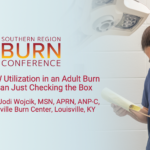Abstract | March 2, 2021
Benefits of LCSW Utilization in an Adult Burn Clinic: More Than Just Checking the Box
Learning Objectives
- Discuss how a licensed clinical social worker impacts an adult burn clinic;
- Demonstrate how the PHQ-2 and PHQ-9 in addition to the GAD-7, effectively screen for depression and anxiety;
- Describe the incidence and prevalence of acute stress in adult burn patients.
Background: The University of Louisville Hospital is the only provider of burn care in the state of Kentucky and for a 250-mile catchment radius. It houses a 16-bed burn center that cares for critically ill burn patients and provides postacute and ambulatory care for a large referral base of burn patients. The clinic is staffed by a wound certified physical therapist, an advanced practice registered nurse and a licensed clinical social worker, with consult access to board certified Trauma and Acute Care Surgery physicians. Major depressive disorder is well described in patients that suffer injury after traumatic events. The incidence after burn injury is higher than those exposed to other types of trauma. Several studies have shown incidence up to 35% to 40% in burn injury patients suffer acute stress symptoms.
Therefore, it is important to identify symptoms of anxiety and depression early and begin symptom management. The outpatient setting provides an ideal setting to identify and manage these symptoms. Typically, post-acute burn patients are followed regularly in clinic and often for extended periods of time. This provides a unique opportunity to identify and monitor symptomology. By employing the help of a licensed clinical social worker in the clinic setting, patients have access to a multi-disciplinary team, and a licensed professional, that can identify symptoms of acute stress and make recommendations for appropriate treatment and follow up in concert with the medical staff. This project seeks to determine the prevalence of acute stress in post-acute burn patients seen in an adult burn clinic and the benefits of utilizing a Licensed Clinical Social Worker to perform screening.
Methods: For a one-year period (February 2019-Feburary 2020) all burn patients in the University of Louisville outpatient burn clinic, who consented to be part of the project, were screened by a Licensed Clinical Social Worker (LCSW). The subjects underwent initial screenings for depression, anxiety, and suicide risk at their first clinic visit. The PHQ-2 and PHQ-9 were utilized to assess depression. The GAD-7 was used to assess anxiety and the Columbia Suicide scale to assess suicide risk. Based on the findings of the screenings the patients were initiated into multi-modal therapies based on specific scoring. These intervention strategies were based on the developed Depression Screening Protocol which included education on depression, and/or anxiety, with or without participation in Trauma/Burn Peer Support Group. Patients might also be prescribed medication per provider discretion, and/or connected to community resources such as, counseling and psychiatric mental health services. Approval was granted by the University of Louisville Institutional Review Board, reference #19.1226.
Results: During the one-year assessment period screening compliance was >90%. During this period, >50% of patient’s scores were clinically significant for acute stress. Over half of those that screened positive were connected to community resources such as, counseling services or psychiatric care. 100% of those that screened positive were given education and connection to peer support services. An incidental correlation was also noted between increased total body surface area involvement and work-related accidents with increased symptomology.
Conclusion: The inclusion of an LCSW in the outpatient burn clinic has improved the overall care of the patient with burn injuries. It has provided a more holistic and overarching picture of the patient’s true injury, both physically and mentally. The assessment of depression and anxiety related to the burn injury has led to an increase in peer support participation and an increase in referrals to counseling and/or psychiatric services. Moving forward, additional assessments will be obtained to determine if early recognition and intervention of acute stress is favorable to decrease the development of post traumatic stress disorder at six months post burn injury. The hope is that early evaluation and treatment of these symptoms return the patient back to pre-burn function and the community earlier.
References and Resources
- Bigley, A.W., Bailey, J.K., Jones, L.M., Calvitti, K.A., Keller, K.C., & Coffey, R.A. (2015). Refocusing to outpatient burn care. Austin Journal of Emergency and Critical Care Medicine, 2(4), 1-4.
- Kornhaber R, Wilson A, Abu-Qamar MZ, McLean L. Coming to terms with it all: adult burn survivors’ ‘lived experience’ of acknowledgement and acceptance during rehabilitation. Burns. 2014 Jun;40(4):589-97. doi: 10.1016/j.burns.2013.08.038. Epub 2013 Nov 25. PubMed PMID: 24286613.
- Difede, J., Cukor, J., Lee, F., & Yurt, R. (2009). Treatments for common psychiatric conditions among adults during acute, rehabilitation, and reintegration phases. International Review of Psychiatry, 21(6),559–569. https://doi.org/10.3109/09540260903344081
- Akarsu, S., Durmus, M., Yapici, A. K., Oznur, T., & Ozturk, S. (2017). Psychiatric assessment and rehabilitation of burn patients. Turkish Journal of Plastic Surgery, 25(1), 20-28.
- Grieve B, Shapiro GD, Wibbenmeyer L, Acton A, Lee A, Marino M, Jette A, Schneider JC, Kazis LE, Ryan CM; LIBRE Advisory Board. Long-Term Social Reintegration Outcomes for Burn Survivors With and Without Peer Support Attendance: A Life Impact Burn Recovery Evaluation (LIBRE) Study. Arch Phys Med Rehabil. 2017 Oct 31. pii: S0003-9993(17)31328-X. doi:10.1016/j.apmr.2017.10.007. [Epub ahead of print] PubMed PMID: 29097179.
6. Badger K, & Royse D. (2010). Helping others heal: burn survivors and peer support. Social Work in Health Care, 49(1), 1–18. https://doi.org/10.1080/00981380903157963

